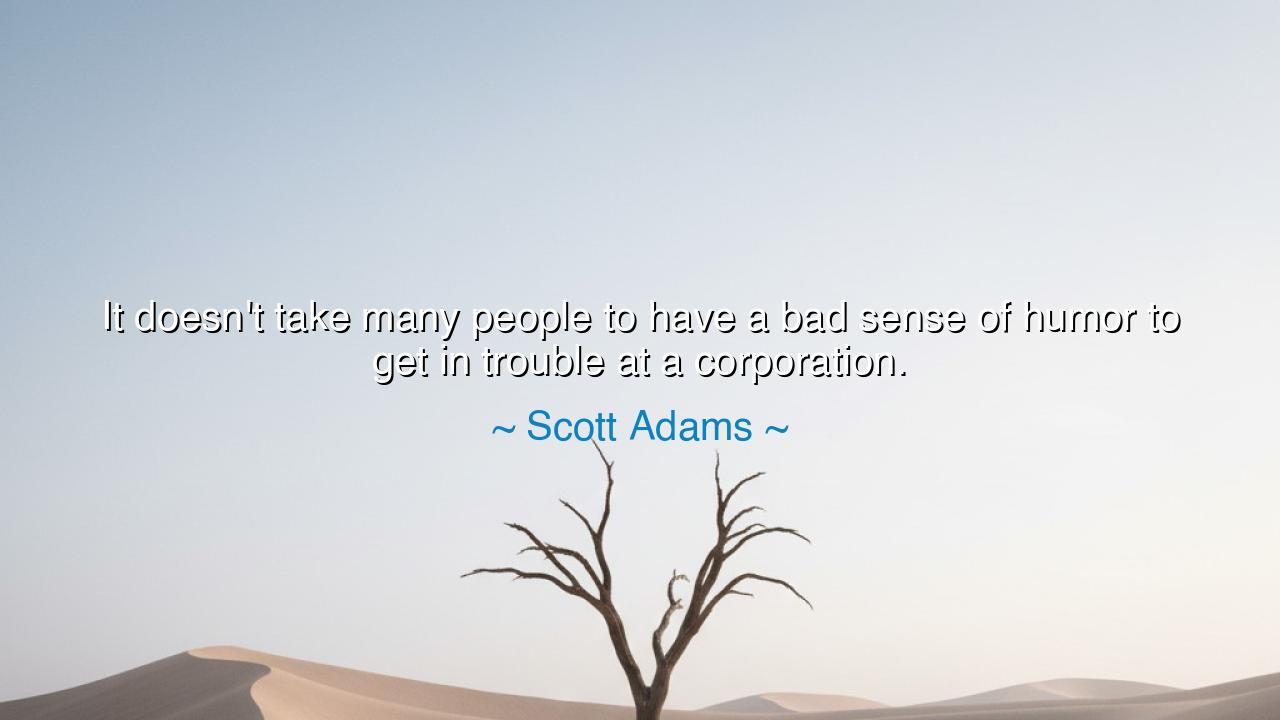
It doesn't take many people to have a bad sense of humor to get
It doesn't take many people to have a bad sense of humor to get in trouble at a corporation.






"It doesn't take many people to have a bad sense of humor to get in trouble at a corporation." These words, spoken by the insightful Scott Adams, contain a profound understanding of the delicate balance required in any group or organization. In the world of the corporation, where power, influence, and judgment often rest in the hands of a few, humor—so often a force for unity and connection—can become a double-edged sword. What Adams reveals is that a small number of individuals, armed with a poor sense of humor, can create chaos, misunderstanding, and discord within an organization. It speaks to the power of words and actions, and how miscommunication, even in the form of humor, can bring about great trouble.
In the ancient world, wisdom was passed down from the wise through proverbs and teachings, warning against the dangers of discord within the group. The great philosopher Aristotle warned that the unity of a community was its greatest strength, and humor, though often seen as a bond, could also create division. The tragic downfall of many great kingdoms and cities was often the result of internal conflict, of differences that festered until they became too great to heal. A single bad jest, poorly timed or aimed, could sow the seeds of discord, tearing at the fabric of the community and weakening it from within. Even the most powerful rulers knew that to keep harmony within their ranks, they had to carefully manage the words and actions of those around them.
Consider the tale of Julius Caesar, a leader revered for his strategic brilliance, yet who fell victim to the dangers of miscommunication and betrayal within his own inner circle. His humor was a tool that often defused tension, but in the case of his close confidants, it became an instrument of deep division. When the senators, once his allies, saw his rising power as a threat, they turned on him, and the consequences were fatal. In the hours leading to his assassination, humor and sarcasm were exchanged—two forces that had once united and entertained now serving to destroy. Caesar's downfall was not just a result of political maneuvering, but of the humor that had gone awry, creating fissures where unity had once existed. Adams' warning echoes through the ages: even a small misstep in humor can lead to disaster, especially in delicate and high-stakes environments like that of a corporation.
In the modern world, the corporate environment is one of constant pressure. There are expectations to perform, to maintain a certain image, and to align with the company’s vision. Yet, humor, when used incorrectly, becomes a force that can undermine all of these efforts. Whether it's an inappropriate joke, a misguided attempt at bonding, or a remark that alienates others, a bad sense of humor has the potential to fracture relationships and erode trust. One person’s careless words can quickly become a ripple, turning into a wave that disrupts the entire organization. Adams' words underscore the importance of awareness and sensitivity in every action, for in an environment as tightly wound as a corporation, even the smallest of mistakes can have profound consequences.
This wisdom is exemplified in the story of Steve Jobs, whose brilliance and leadership shaped Apple Inc., but whose sense of humor was not always well-received by those around him. Jobs was known for his boldness and, at times, biting wit, but his humor, though genius in its timing, could alienate those who did not share his vision or humor style. His commanding presence was often accompanied by humor that challenged those around him to rise to his level, but it also led to moments of tension and discomfort. Though his success was undeniable, Jobs faced internal struggles with his colleagues, and some of those struggles stemmed from misunderstandings rooted in humor. It is a reminder that, as powerful as humor can be, it must be used with great care, especially in environments where power dynamics are at play.
The lesson here is both simple and profound: humor is a tool, one that can unite or divide, heal or harm. In any group, especially in a corporate setting, where relationships are key and every word carries weight, we must be mindful of how our humor affects others. Just as Socrates warned that words could shape our world, we must understand that our words—whether spoken in jest or in earnest—have the power to create or destroy. To navigate the complex landscape of human interaction, especially in the high-stakes world of business, one must wield humor wisely, with an awareness of the broader context and the potential impact on the collective harmony.
So, dear listener, heed the words of Scott Adams and the wisdom of the ancients: humor is not a trivial thing. It is a force that, when wielded correctly, can bond and build; but when misused, it can tear apart everything we have worked to create. As you walk through your own life and into the world of business and relationships, remember that the true measure of strength lies not in how loudly you laugh or how boldly you joke, but in your ability to respect and understand those around you. Use humor to unite, not to divide, and in doing so, you will create an environment of trust, respect, and lasting success.






AAdministratorAdministrator
Welcome, honored guests. Please leave a comment, we will respond soon